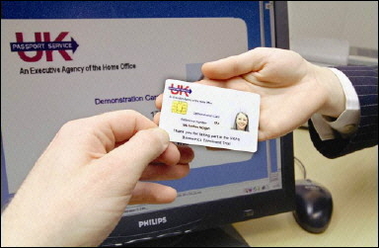|
British govt wins crucial votes on ID cards
(AFP)
Updated: 2006-02-14 09:15
The British government won two crucial rounds of parliamentary votes as
lawmakers in the lower House of Commons debated controversial plans to introduce
identity cards.
Prime Minister Tony Blair's ruling Labour party successfully fought off a
move to make the take-up of ID cards entirely voluntary on application for or
renewal of a British passport from 2008.
The amendment to the Identity Cards Bill -- which has drawn strong criticism
from civil liberties campaigners and rebel Labour members of parliament -- was
proposed by the unelected upper chamber House of Lords last month.
But in the first vote, MPs voted to overturn the Lords' amendment by 310
votes to 279 -- a 31 majority. In a second vote on a similar amendment, the
government won by 310 to 259 -- a majority of 51.
The vote ensures that the Bill will go back to the upper chamber, with
members there now having to decide whether to back down or stand firm.
Prime Minister Tony Blair missed the vote after a fault with his plane
delayed him in South Africa, where he has been attending a mini-summit on world
poverty.

An undated handout photograph from the British
Home Office shows a proposed government identity card.
[AFP] | Although compulsory ID cards are the norm
in many countries, Britain has had no such system since shortly after World War
II. Opponents argue the cards are an unnecessary -- and costly -- infringement
of civil liberties.
David Davis, the main opposition Conservative Party's home affairs spokesman,
warned ID cards would see Britain "sleepwalking into a surveillance state".
His opposite number for the smaller Liberal Democrats, Alistair Carmichael,
accused Labour of reneging on a pledge not make ID cards compulsory, describing
the passport-linked scheme as "compulsion by the backdoor".
Home Secretary Charles Clarke has said a stand-alone ID card would cost 30
pounds (44 euros, 52 dollars), while one linked to a passport would cost 93
pounds.
But a London School of Economics report estimated the cards -- which would
contain biometric details such as a person's fingerprints, iris or facial scans
-- could cost up to 300 pounds each.
The vote on ID cards is just one of several controversial votes the
government faces in the coming days, including on the "glorification" of
terrorism and the extension of a ban on smoking to cover all pubs and clubs.
Education reform is also coming up.
Last month the government suffered a double defeat in parliament on a key
part of legislation to combat religious hatred, even though Blair could have
swung one of the votes had he turned up to cast his own.
It was Blair's third such legislative defeat since coming to power in 1997,
but the first only occurred last year, raising speculation that his grip on
power was beginning to slip.
|